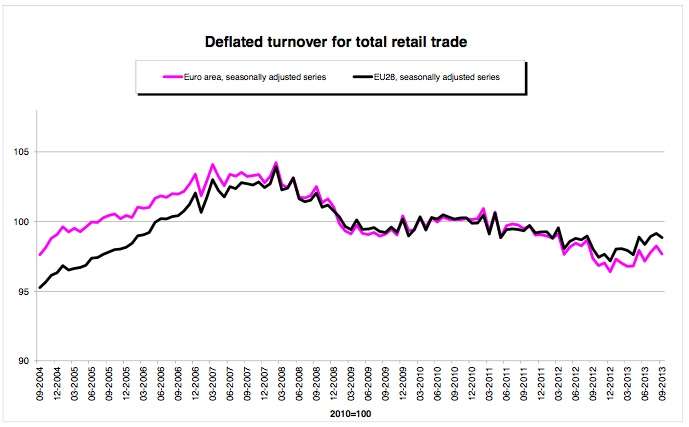European retail trade dropped 0.6% in September compared to August in the euro area, according to Eurostat, the European Union’s statistics agency, further dampening the vigor of the region’s economic growth.
The European Union has two areas:
- EA17 – consisting of the 17 countries that use the euro as their country, also known as the eurozone.
- EU28 – consisting of all the 28 European Union Member States.
Eleven EU Member states do not use the euro as their currency.
European retail trade fell in September compared to August as follows:
- EA17 by (minus) -0.6%
- EU28 by (minus) -0.3%
Therefore, within the 11 non-euro Member States retail trade grew in September.
In August compared to July, European retail trade had grown by 0.5% in EA17 and 0.2% in EU28.
In EA17 in September foods, drinks and tobacco fell by 0.6, and by 0.5% in EU28. The non-food sector fared better, falling by 0.1% in EA17 and rising by 0.3% in EU28.
European retail trade yearly comparison
Retail trade comparing September 2013 to September 2012:
- Food, drinks and tobacco – (minus) -1.1% in EA17
- Food, drinks and tobacco – (minus) -0.9% in EU28
- Non-food sector – (plus) 1.1% in EA17
- Non-food sector – (plus) 2.3% in EU28
The Eurozone is emerging from 6 consecutive quarters of recession with 0.3% GDP growth. However, these retail trade data as well as some other statistics point to a very fragile economic recovery.
The BBC quotes Global Insight’s chief economist Howard Archer, who said “September’s relapse in retail sales fuels suspicion that consumers across the eurozone will likely remain pretty cautious in their spending in the near term. Significantly, retail sales fell back sharply in Portugal – by 6.2% month-on-month – and Spain – by 2.5% month-on-month – in September. German consumers have been generally reluctant overall to significantly step up their spending on a sustained basis in an uncertain environment.”
The Markit Eurozone PMI Composite Output Index for October was 51.9, lower than September’s 27-month high of 52.2. However, according to Markit Economics, October’s figure was higher than the flash estimate of 51.5, suggesting that the GDP growth slowdown was less marked than originally feared.
European jobless recovery – yesterday, the European Commission predicted that the Europe’s economic recovery will not reduce unemployment in the medium term. Economists across the world disagree on why jobless recoveries occur.

